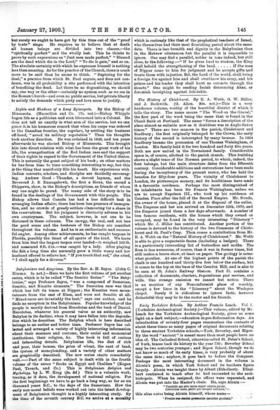Babylonians and Assyrians. By the Rev. A. H. Sayee. (John
C. Nimmo. 5s. net.)—Here we have the first volume of yet another series, which is to be called "The Semitic Series." " The Baby- lonian," says Professor Sayce, "was a compound of Sumerian, Semitic, and Kussite elements." The Sumerian race was that which has left its traces at Nippur; the Kussites were moun- taineers from the east of Elam, and were not Semitic at all. " Mixed races are invariably the best," says our author, and he finds no exception in the Babylonians. Popular knowledge of the people is mostly derived from Herodotus and the book of Daniel. Herodotus, whatever his general value as an authority, saw Babylon in its decline, when it may have fallen into the degrada- tion which he describes. The Babylon which is here described belongs to an earlier and better time. Professor Sayce has col- lected and arranged a variety of highly interesting information about their manners and customs, their social and economical institutions, their religion, &c. The book is full of curious and interesting details. Babylonian life, the diet of rich and poor, their houses, the price of wheat, the rent of land, the system of moneylending, and a variety of other matters are graphically described. The new series starts remarkably well.—Part of the same subject is dealt with in the fourth volume of the series "Books on Egypt and Chaldwa " (Kegan Paul, Trench, and Co.) This is Babylonian Religion and Mythology, by L. W. King (3s. 6d) This is a valuable work, tracing, as it does, the development of national religion. For the first beginnings we have to go back a long way, as far as six thousand years B.C., to the days of the Sumerians. How the early non-moral beliefs were worked out into the latest develop- ment of Babylonian thought is a highly interesting study. By the time of the seventh century B.C. we arrive at a morality which is curiously like that of the prophetical teachers of Israel, who themselves had their most flourishing period about the same date. There is less breadth and dignity in the Babylonian than in the Hebrew utterances, but the parallel it is impossible to igiore. One may find a parallel, nobler in tone indeed, but still close, to the following :—" If he gives heed to wisdom, the King
shall behold the strengthening of the land If the men of Nippur come to him for judgment and he accepts gifts and treats them with injustice, Bel, the Lord of the world, shall bring a foreign foe against him and shall overthrow his army, and his prince and his leader they shall hunt as outcasts through the streets." One might be reading Isaiah denouncing Ahaz, or Jeremiah inveighing against Jehoiakin.


















































 Previous page
Previous page